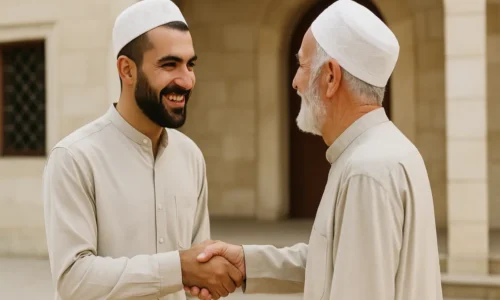In Islam, marriage is the only time when a man and a woman can express physical intimacy. One of the most frequently asked questions by young Muslims today is: “Can Muslims kiss before marriage?” The answer comes from Islamic ethics, modesty and the main goals of Shariah. Kissing before marriage is not only up to each person—it involves moral standards, spiritual results and the rules set by Allah ﷻ.
Can Muslims Kiss Before Marriage? The Clear Islamic Position
According to Islam, it is forbidden to touch or be touched in a way that may lead to attraction or sexual desire, unless you are married. Kissing, whether it’s on the lips, cheeks or some other part of the body, is seen as a sign of physical intimacy. As a result, Muslims should not kiss before marriage, no matter how innocent the kiss might look.
The Prophet Muhammad ﷺ made it clear that it is wrong to be alone with someone of the opposite sex. In a hadith recorded in Sahih Bukhari (Hadith 3006), the Prophet ﷺ said:
“No man is alone with a woman but the Shaytaan is the third.”
It demonstrates that Islam helps avoid circumstances that could lead to sin. Kissing in private can easily become a big sin.
Quranic Guidance: Physical Boundaries Before Marriage
The Holy Quran commands both men and women to lower their gaze and guard their private parts:
“Tell the believing men to lower their gaze and guard their chastity. That is purer for them. Surely Allah is All-Aware of what they do.”
(Surah An-Nur 24:30)
This verse highlights the main idea of Islamic modesty. If Muslims are told to avoid even looking at someone with lust, kissing which can stir sexual feelings, is even more serious and spiritually dangerous.
Scholars’ Opinions on Kissing Before Marriage
All Islamic scholars agree that touching a non-mahram man or woman is forbidden. Imam Nawawi رحمه الله explains in Sharh Sahih Muslim:
“It is forbidden to touch a woman who is not one’s mahram, with no doubt in that, and it is haram with the consensus of the scholars.”
Even if you are not feeling lust, kissing can bring you close in a way that Islam advises against before marriage.
Emotional Attachment and Consequences
Besides the religious law, kissing someone before marriage can hurt your feelings. Often, it causes people to feel let down, guilty and sad, especially if the relationship doesn’t result in marriage. Islam helps people avoid such pain by setting clear boundaries.
Also read: Is Kissing Zina?
After a couple goes beyond physical limits before marriage, it can be hard to stop. As the Prophet ﷺ explained in a hadith from Sahih Muslim:
“The eyes commit zina, the hands commit zina, and the feet commit zina…”
So, acts that are not intercourse such as passionate kissing or touching, can still be considered zina (fornication).
The Wisdom Behind the Prohibition
Some may argue: “What’s the harm in just one kiss?” But Islam looks at the bigger picture. Kissing before marriage:
- Weakens taqwa (God-consciousness)
- Opens the door to zina
- Damages spiritual and emotional purity
- Reduces the sanctity of halal marriage
Islam preserves love and affection for the right time—after nikah, where it becomes an act of worship and reward.
Alternatives: What Should Muslims Do Instead?
Young Muslims are encouraged to follow the Sunnah way of approaching marriage:
- Lower the gaze and guard modesty
- Involve family and elders early
- Avoid unnecessary interactions with non-mahram
- Make du’a for a righteous spouse
- Perform Istikhara for marriage decisions
Marriage means more than just being together physically; it is a lasting promise of faith, values and companionship. Muslims are guided by Islam to focus on the afterlife, not only on what brings them pleasure here.
Conclusion: Can Muslims Kiss Before Marriage?
The Islamic sources make it clear that Muslims are not allowed to kiss before marriage. It is forbidden because it breaks the physical limits set by Allah and can lead to other serious sins. Kissing should only happen between two people who are married. Muslims keep their hearts, faith and future marriages safe by following the Quran and Sunnah.










